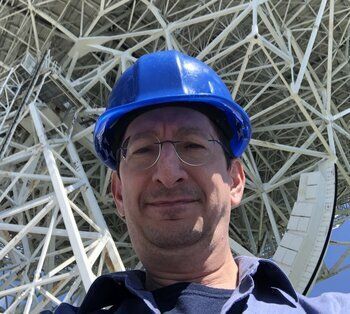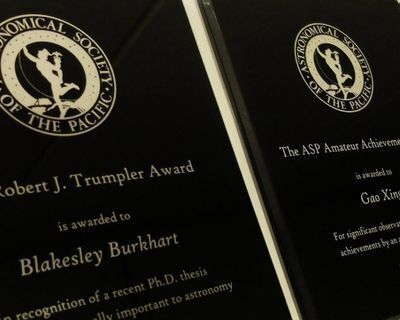Nominations for the 2026 ASP Awards open February 3 through March 31
-
The Richard H. Emmons Award will be given in 2026
2024 Award Recipient Announced
Richard H. Emmons Award
For excellence in college astronomy teaching
Added to our list of honors in 2006, the Richard H. Emmons Award was inspired by a very generous gift from Jeanne and Allan Bishop, in honor of her father, Richard Emmons. Dr. Jeanne Bishop, a well-known astronomy educator in her own right, wished to honor her father, an astronomer with a lifelong dedication to astronomy education, by creating an award that recognizes and celebrates outstanding achievement in the teaching of college-level introductory astronomy for non-science majors.

2024 Emmons Award is given to Daniel Reichart, distinguished professor and innovator of teaching methods and programs committed to bringing quality astronomy education at the college level to all students.
San Francisco, California- September 16, 2024 - The Astronomical Society of the Pacific’s Richard H. Emmons Award — established by Jeanne & Allan Bishop to honor Ms. Bishop’s father, Richard Emmons, an astronomer with a lifelong dedication to astronomy education — is awarded annually to an individual demonstrating outstanding achievement in the teaching of college-level introductory astronomy for non-science majors. The 2024 recipient is Prof. Daniel Reichart, Department of Physics and Astronomy, University of North Carolina at Chapel Hill for his innovative teaching methods, pioneering creation of educational programs and for committing to the introductory, non-science student and instructor communities.
Reichart’s dedication to astronomy began twenty years ago with educational projects extending beyond the classroom. National funding for the Panchromatic Robotic Optical Monitoring and Polarimetry Telescopes (PROMPT) in 2004 which he still directs, led to his creation of the worldwide Skynet Robotic Telescope Network, promoting his vision for accessible, hands-on astronomical research. These programs, while creating global resources for astronomers monitoring gamma-ray bursts via an observational engine, have more importantly provided opportunities for student-initiated observation. Reichart’s educational philosophy according to one colleague is the “ardent desire of empowerment to introductory astronomy students who are not planning to major in science.” Giving them the same tools, ideas, and projects as professionals provides equitable opportunity and extends into his personally created YouTube channel (Skynet University) where he provides hours of tutorials to sharpen students’ skills. One instructor sums up his impact on how “Dan treats undergraduate curriculum development with the same effort and seriousness as many large university astronomers treat their research.”
Not only has Reichart been a Principal or Co-Principal Investigator on over 40 grants, but he has engaged over 14,000 students in his now over 20-year career as a Professor of Physics and Astronomy. Inspired by a trip to Green Bank Observatory as an undergraduate, he went on to create the annual Educational Research in Radio Astronomy (ERIRA) program. ERIRA is a yearly, week-long learning experience to inspire budding astronomers across North America with quality education resources that remove barriers, enabling novice learners to use optical and radio telescopes to align, stack, and create color images, or develop a set of analysis tools to make measurements and draw inferences. He has been dedicated to removing barriers and enabling students to participate in their own learning journeys working with real data, understanding their own work, and core topics in introductory astronomy. As one nominator expressed, “his innovative programs have left an indelible mark on the field and on the lives of countless students and educators.”
Join us in celebration of Daniel Reichart’s achievements at the in-person ASP Awards Gala on Saturday, November 9, 2024 in Burlingame, CA.
Please contact the Awards team if you have questions about the nomination process

